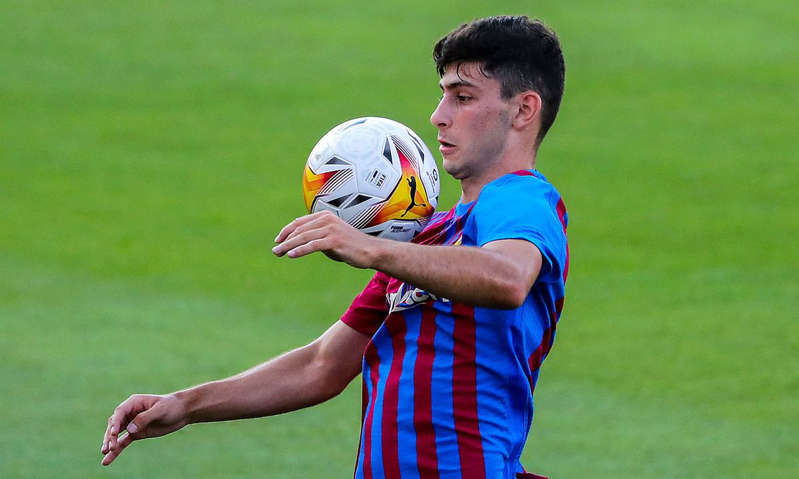
Yusuf Demir / Image: GEPA pictures
With the debut of Yusuf Demir for FC Barcelona on Saturday in Bilbao against Athletic, a long-forgotten former Austrian Barca legionnaire suddenly emerged from the historical oblivion. The website of the Catalan club said that before the ÖFB youngster and Hans Krankl (1978-1981), a certain Ernst Löwinger was under contract with FC Barcelona in 1934. Of course, he only played in four friendlies.
Löwinger was loaned out by Young Boys Bern in 1934, according to the FC Barcelona website. The background may have been that the ex-Hakoah player Richard Kohn (1888-1963) was working as a trainer for the “Cules” at the time, as the sports historian Matthias Marschik in his book “Moving Bodies. Historical.” Popular cultures of sport in Austria “.
There you can also find out that the shipping agent Ernst Löwinger, born in 1909, also came from the ranks of the Jewish sports club Hakoah. Later, “the very capable middle runner” switched to the WAC and even reached the Mitropacup final against Vienna in two games in 1931 with the club from the Vienna Prater. As there were two Austrian clubs, the first final game of this international competition was played on November 8th in the Hardturm Stadium in Zurich. The second leg took place on November 12th on the Hohe Warte. Vienna won both times (3: 2 and 2: 1), Löwinger was used in the second match.
One of 200 Viennese who moved to Europe
At the WAC, Löwinger was mostly a substitute for the two Austrian football greats Josef Smistik and Karl Sesta. Löwinger was one of around 200 Viennese footballers who, due to the precarious economic situation in Austria, which also had a lasting impact on Viennese football, mainly in France and Spain, but also in Scandinavia, the Balkans and the Mediterranean region, their luck and a sufficient income were looking for. In 1932 he moved to Red Star Paris. In France, according to historian Marschik, Löwinger was not only active as a player, but also as a reporter for the “Sport-Tagblatt”, for which he reported on French football. In France, the legionnaire, who liked to hike, also played for Amiens and Nice, where he attracted attention for his “caution and good ball handling”.
After his not so successful engagement with FC Barcelona, Löwinger also ended up in Malta. In 1936 he was under contract with the Sliema Wanderers. Although or perhaps because he was collecting “the enormous sum of £ 20 a month” there, disputes arose. According to the newspaper “Malta Chronicle”, Löwinger announced a breach of contract lawsuit, as Marschik reports in his book.
The mystery
The rest of the story is a mystery in contemporary history. “This is the last source on Ernst Löwinger, who then disappears from the picture. There are no indications of a transfer or a new commitment, nor of a return to Vienna. Ernst Löwinger is neither on the lists of Holocaust victims, nor is one Evidence of emigration to the USA or South America, he is neither in Palestine nor on the lists of former Hakoah players, “writes the historian.
Marschik also wrote to the APA: “I did a lot of research into where Löwinger might have disappeared after 1936, but neither the relevant sources on Jews after 1938 nor individual inquiries in Vienna and Israel revealed anything.” According to the historian, it is obvious “that he has adopted a different name”. In any case, Löwinger's further fate is still unknown today.

